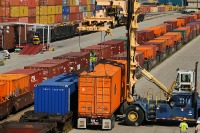“From October 2007 through June 2015, OSHA figures show, railroad workers filed more than 2,000 retaliation complaints.”

That count comes from a railroad workplace safety investigation originally reported on FairWarning.org and reposted on Salon. The retaliations came in the form of firings, demotions, suspensions, and threats and harassment from supervisors. The sole sliver of good news from the article is that the U.S. Department of Labor and its Occupational Safety and Health Administration have been able to win about half of the lawsuits brought on behalf of illegally treated rail employees under the whistleblower protection provisions of the 2007 Federal Railroad Safety Act, or FRSA.
Three rail corporations that have shown themselves particular prone to mistreating endangered and hurt employees are BNSF (409 FRSA retaliation complaints), Union Pacific (360) and Norfolk Southern (247).
The entire article is worth reading for what it reveals about pressures put on both workers and managers to cover up unsafe work conditions and to not report or seek medical treatment for on-the-job injuries. Insights into the deep roots of what the authors describe as the “paramilitary” structure of labor relations in the railroad industry also merit consideration.
Still, the passage that particularly jumped off the computer screen for me was this:
Experts say much of the worker litigiousness stems from a 1908 law that excluded railroad employees from state workers compensation systems. Instead, it required them to go to court if they wanted to seek compensation for on-the-job injuries. That created a strong market for personal injury attorneys who specialize in railroad litigation.
Leaving aside the fact that only one “expert” is quoted espousing this opinion–a professor who testifies on behalf of railroads in the derided Federal Employers Labor Act (FELA) lawsuits–the statement paints fighting on behalf of injured workers as mercenary and illegitimate. When was the last time you saw a sympathetic plaintiff was described as litigious?
As a FELA plaintiffs’ attorney for more than 20 years, I could feel insulted. Rather, I find myself vindicated in my long-held belief that railroads and their representatives must be subject to appropriate checks and balances on worker safety. I also know now more than ever that the jury system serves as a bulkhead to ensure rail corporations provide a safe workplace for rank-and-file workers.
Fortunately, if depressingly necessary, courts, federal regulators and a national network of personal injury and wrongful death lawyers recognize that railroad employees have rights to remain safe at work and to hold those who violate that first right accountable.
EJL





